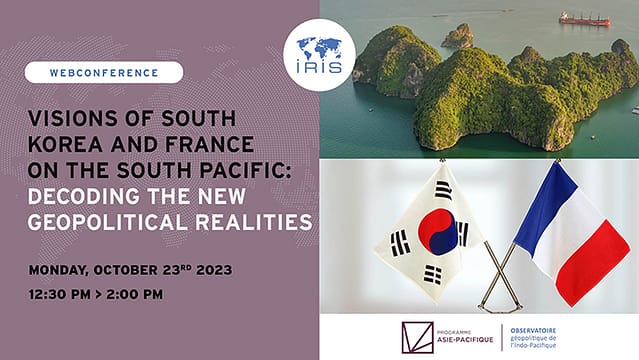|
|
Guest Speakers :
|
|
|
Dr Arnaud LEVEAU, Senior Research Fellow, Asie 21
|
|
|
Mijo PARK, Director for Asian and Pacific Regional Cooperation Division, South Korean Ministry of Foreign Affairs
|
|
|
Ambassador Véronique ROGER-LACAN, Permanent Secretary to the Pacific Community Forum and Secretariat of the Pacific Regional Environment Programme, French Ministry for Europe and Foreign Affairs
|
|
|
Session chairman:
|
|
Marianne PERON-DOISE, Associate Research Fellow and Director for the Indo-Pacific Geopolitical Observatory (IGO), IRIS |
|
|
On December 28th 2022, South Korea issued its long awaited “Strategy for a free, peaceful and prosperous Indo-Pacific Region”. With this strategy, in which it describes itself as a “pivotal State”, South Korea aims to show how the middle powers can shape the regional dynamics that are increasingly marked by the strategic rivalry between the United States and China. This rivalry has taken a new turn in the South Pacific vis-à-vis the member states of the Pacific Islands Forum, of which France is a member on behalf of its territories of New Caledonia and French Polynesia, with competing initiatives between Washington and Beijing.
|
|
In its Indo-Pacific Strategy, South Korea calls for deepening engagement with the Pacific Islands countries (PIC) on climate change, renewable energy, healthcare, oceans, and fisheries issues. All aspects align with France‘s objectives in promoting regional resilience against environmental challenges as President Macron pointed out during his recent travel to Oceania in July 2023.
|
|
The conference will look at the many challenges and strategies facing the South Pacific as the PIC themselves develop their own vision through the “2050 Strategy for the Blue Pacific Continent”. In particular, it will explore possible areas of cooperation between France and South Korea, in the light of the many existing initiatives and in line with the guidelines set out by the regional authorities.
|
|

